College of Engineering graduate Segolene Muderhwa works to elevate girls in her home country

When Segolene Muderhwa describes her home country, the Democratic Republic of the Congo, she speaks with great pride – and great concern.
The Congo is abundant in mineral resources. Its people are welcoming and creative. But the Eastern provinces have been ravaged by decades of violence and instability. Rape has been used as a weapon of war, destabilizing communities where Congolese women are the heart of the family unit.
Today, Segolene (ISyE ’17) talks of young people in the Congo taking the initiative to find ways of serving their country. She is one of them.

Segolene was fortunate to have been raised in the western capital of Kinshasa, away from the conflicts in Eastern Congo, but she witnessed the struggle of youth every day.
“I would see girls my age begging in the street,” she recalls. “They would ask me to spare some cookies or water with them. I would see kids my age walking to school with plastic bags as school bags and torn up shoes.”
She also had the benefit of a mother who taught her children to share. “She would always take us to the orphanage to donate things,” Segolene says. That experience was a harbinger of what was to follow in Segolene’s life.
As a second-year college student in the U.S., Segolene and her friends from Congo talked about how they might give back to their home country. They decided to launch a nonprofit, Soeur Leve-toi, which is French for “Sister, Stand Up,” to help disadvantaged girls in Congo pursue and persist in their education.
“We decided to focus on young girls because it’s most difficult for them,” she says. “If you’re a seven-year-old girl on the street, you cannot defend yourself. Not only that, girls have less of a chance of going to school. If a family can’t send all the kids to school, they send the boys first, even if the girls are smart.” The rationale, she explains, is that the boy will take care of the family when he grows up, whereas “the girl will marry and belong to another family.”
Of course, a small nonprofit like Soeur Leve-toi can’t correct such a societal imbalance alone. But Segolene and her co-founders knew they could have a profound impact on the lives of some girls, all of whom live in orphanages.
Through Soeur Leve-toi, they created a network to connect the girls to adult supporters through a yearly “Women-to-Women” conference. They started a series of summer camps to build confidence and self-esteem. “The camps help them believe they can do something with their lives,” Segolene says. “In camp, we work with girls who heard, every day, they can’t do anything with their life.”
Soeur Leve-toi also launched the Malaba Scholarship, which Segolene oversees, to help more girls take their studies further. Beyond financial support, the scholarship program provides personal guidance in the form of “godmothers,” who meet frequently with the girls who receive the scholarships.
Maliyamungu Muhande, who heads communications for Soeur Leve-toi, also grew up in Congo. “The thing that’s beautiful about Soeur Leve-toi is that girls and women unite to empower each other,” she says. “Segolene is one of those. She’s so disciplined, and that’s one reason I really look up to her. We share a mutual yearning for change in our country.”
As for preparing for such a challenge, Segolene credits her Georgia Tech experience, which includes an M.S. in Analytics, as well as an undergraduate degree in industrial systems engineering. Perhaps one of those girls will also end up an engineer someday to bring about more change — in places where it’s needed most.